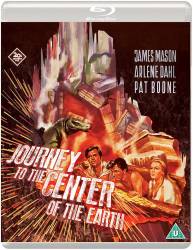Corrected entry: When the dimitridon (those sail-finned dinosaurs) is attacking the Count and the Professor, the Professor states that dinosaurs can't swim. Then why would a whole pack of them live on the seashore? If they can't swim, than what's the advantage? They wouldn't be able to catch fish, and crabs would be too small.

Journey to the Center of the Earth (1959)
1 corrected entry
Directed by: Henry Levin
Starring: James Mason, Diane Baker, Pat Boone, Arlene Dahl, Alan Napier, Peter Ronson, Robert Adler, Thayer David

Visible crew/equipment: A giant lizard grabs hold of Mason with its very long tongue. Cables can be seen around the fake tongue which are both wrapped around Mason's left leg. (02:00:10)
Sir Oliver Lindenbrook: A field of force that snatches gold away! This is it, this is it! The junction of magnetic forces from the North Pole to the South Pole - the center of the earth.
More trivia for Journey to the Center of the Earth
Question: When the gang explore the ruins of the city, you can hear a low pitch humming noise. What was making that noise?





Correction: Crabs may be too small, but animals that prey on crabs may not be. Fish can also wash up on the beach, and they can scavenge them and larger fish or aquatic reptiles. Also, rivers and streams usually empty into the ocean, so fresh water would be nearby. If they also eat vegetation, there is probably an abundance of vegetation around a shore as well. They may also prefer the open terrain for its abundant sun.